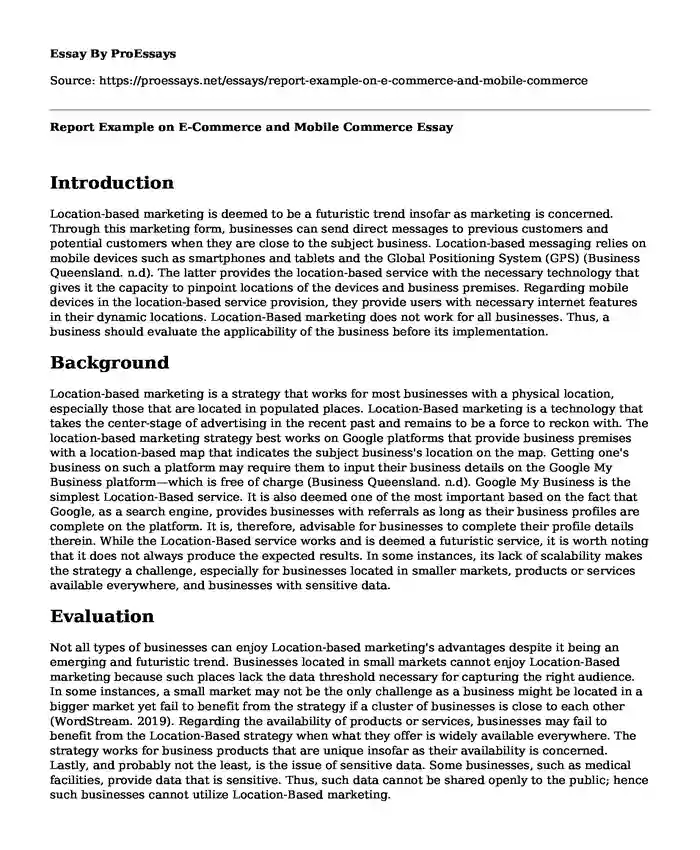Introduction
Location-based marketing is deemed to be a futuristic trend insofar as marketing is concerned. Through this marketing form, businesses can send direct messages to previous customers and potential customers when they are close to the subject business. Location-based messaging relies on mobile devices such as smartphones and tablets and the Global Positioning System (GPS) (Business Queensland. n.d). The latter provides the location-based service with the necessary technology that gives it the capacity to pinpoint locations of the devices and business premises. Regarding mobile devices in the location-based service provision, they provide users with necessary internet features in their dynamic locations. Location-Based marketing does not work for all businesses. Thus, a business should evaluate the applicability of the business before its implementation.
Background
Location-based marketing is a strategy that works for most businesses with a physical location, especially those that are located in populated places. Location-Based marketing is a technology that takes the center-stage of advertising in the recent past and remains to be a force to reckon with. The location-based marketing strategy best works on Google platforms that provide business premises with a location-based map that indicates the subject business's location on the map. Getting one's business on such a platform may require them to input their business details on the Google My Business platform—which is free of charge (Business Queensland. n.d). Google My Business is the simplest Location-Based service. It is also deemed one of the most important based on the fact that Google, as a search engine, provides businesses with referrals as long as their business profiles are complete on the platform. It is, therefore, advisable for businesses to complete their profile details therein. While the Location-Based service works and is deemed a futuristic service, it is worth noting that it does not always produce the expected results. In some instances, its lack of scalability makes the strategy a challenge, especially for businesses located in smaller markets, products or services available everywhere, and businesses with sensitive data.
Evaluation
Not all types of businesses can enjoy Location-based marketing's advantages despite it being an emerging and futuristic trend. Businesses located in small markets cannot enjoy Location-Based marketing because such places lack the data threshold necessary for capturing the right audience. In some instances, a small market may not be the only challenge as a business might be located in a bigger market yet fail to benefit from the strategy if a cluster of businesses is close to each other (WordStream. 2019). Regarding the availability of products or services, businesses may fail to benefit from the Location-Based strategy when what they offer is widely available everywhere. The strategy works for business products that are unique insofar as their availability is concerned. Lastly, and probably not the least, is the issue of sensitive data. Some businesses, such as medical facilities, provide data that is sensitive. Thus, such data cannot be shared openly to the public; hence such businesses cannot utilize Location-Based marketing.
Conclusion
While the Location-Based Strategy may work for most businesses, it is prudent for business owners to research factors that influence its success, such as population and availability of similar businesses in the area. It is also important for businesses to distinguish the type of data they need to share and the impact of sharing such data with the public, say in their business profile (WordStream. 2019). There is also a need to combine Location-Based marketing with other types of advertising, particularly ground-based strategies, as they would enable the subject business to amass more accurate data.
References
Business Queensland. (n.d). How location-based marketing works. Queensland Government. https://www.business.qld.gov.au/running-business/marketing-sales/marketing-promotion/online-marketing/location-based/how
WordStream. (2019, June 19). Location-based marketing: what works and what doesn’t. The WordStream Blog. https://www.wordstream.com/blog/ws/2019/06/19/location-based-marketing.
Cite this page
Report Example on E-Commerce and Mobile Commerce. (2023, Dec 12). Retrieved from https://proessays.net/essays/report-example-on-e-commerce-and-mobile-commerce
If you are the original author of this essay and no longer wish to have it published on the ProEssays website, please click below to request its removal:
- 6 Aims of Health Care Quality Essay
- The Positive Side of Negative Political Advertising - Essay Sample
- Essay Sample on Navigating Complexities in Supply Chain Management
- Creating a Personalized Leadership System for Optimal Organization Success - Essay Sample
- Essay on Advancing Human Service Delivery: Improving Accessibility, Responsibility, and Coordination
- Essay Sample on Organizational Transformation: Strategies for Success
- Evaluating the External Environment - Free Essay Example







